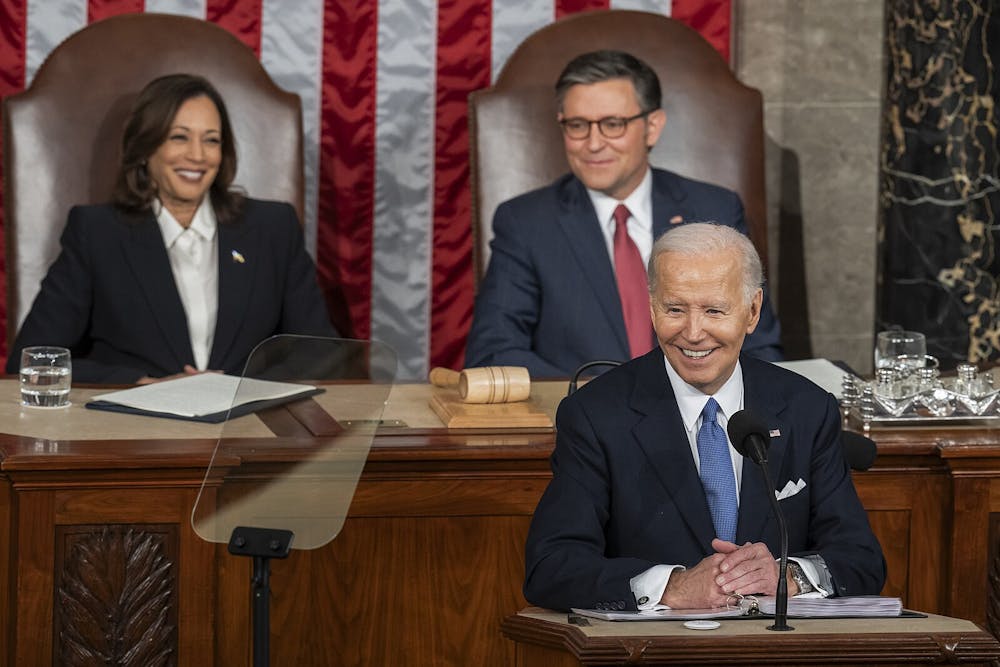By Gauri Patel
Staff Writer
The Senate passed a $95 billion foreign aid package on April 23, delivering billions of dollars in aid to Ukraine, Taiwan and Israel. After months of delay, the bill secured passage with a vote of 79-18, following the House's approval of the package three days prior, according to Reuters. President Joe Biden promptly signed it into law soon after.
The aid package, which garnered bipartisan support in the Senate, aims to provide assistance in separate bills to the United States’ allies. It combines four bills, allocating nearly $61 billion to Ukraine for defense against Russian aggression, over $26 billion in aid to Israel and humanitarian relief in Gaza and more than $8 billion to "counter communist China" in the Indo-Pacific region, according to Reuters.
The package includes a fourth bill, added by the House in a move to bolster Republican support, that includes provisions that could lead to a ban on the Chinese-controlled social media app TikTok in the U.S. It gives the app’s parent company, ByteDance, roughly nine months to sell TikTok or risk being banned from U.S. app stores.
TikTok has vowed legal action to challenge the legislation, with CEO Shou Chew telling users in a video posted to the app, “Rest assured: we aren’t going anywhere. We are confident and we will keep fighting for your rights in the courts. The facts and the Constitution are on our side and we expect to prevail.”
Much of the foreign aid package largely resembles the previous measure passed by the Senate in February, in which leaders of the Republican-controlled House would not allow a vote over opposition to sending aid to Ukraine. The vote had been stalled after House Republicans demanded action on border security first, leading to months of negotiations.
The addition of the bill that could lead to the potential ban of TikTok in the U.S. was one of the changes made to the original package. Other additions included structuring a part of the funding for Kyiv as loans, provisions to allow the U.S. to seize Russian sovereign assets that have been frozen to rebuild Ukraine and new sanctions on Iran, according to NPR.
The legislation was then brought to the House floor for a vote after Speaker Mike Johnson (R-La.) made the decision to advance the package with the added changes, despite Republican opposition and threats to oust him from his position by hardline conservatives.
Congressional leaders who support the aid package have faced opposition from many Republicans in the House and Senate, who are increasingly skeptical of U.S. involvement in foreign issues and argue that there should instead be a focus on the migration issues at the U.S.-Mexico border. Opposition has also stemmed from those closely aligned with former President Donald Trump, who supports an "America First" approach to foreign policy and does not support aid for Ukraine.
According to NPR, many Republican senators reversed course from their prior opposition to the package and have voted to advance it. Among them was Sen. Lindsey Graham (R-S.C.) who originally voted against the package in February over the belief that Congress should prioritize addressing illegal immigration at the southern border. Graham emphasized the importance of supporting the U.S.’s close allies and argued that failing to provide aid would give an advantage to Iran, Russia and China, which pose threats to U.S. interests.
“If we don't help Ukraine now, this war will spread, and Americans who are not involved will be involved," Graham said, according to NPR.
After previously expressing his support for the aid package, Biden, who is expected to face likely Republican nominee Trump in the November election, signed the legislation into law soon after the Senate passed it. He also signed the bill leading to the potential ban of TikTok, despite his campaign utilizing the app to reach voters.
Biden has pressed lawmakers for six months to approve more funding for Ukraine and had spent months lobbying Johnson to move forward with the aid package. In remarks, he acknowledged the challenges to get the package passed while thanking Congressional leaders for their bipartisan support. He added that he had approved an initial $1 billion in military supplies to Ukraine to be sent within hours, including air defense equipment, munitions and armored vehicles.
“I'm grateful to all those in Congress, Democrats, Republicans, independents, who voted for this bill. To my desk, it was a difficult path. It should have been easier, and it should have gotten there sooner,” Biden said. “But in the end, we did what America always does. We rose to the moment, we came together, and we got it done.”







